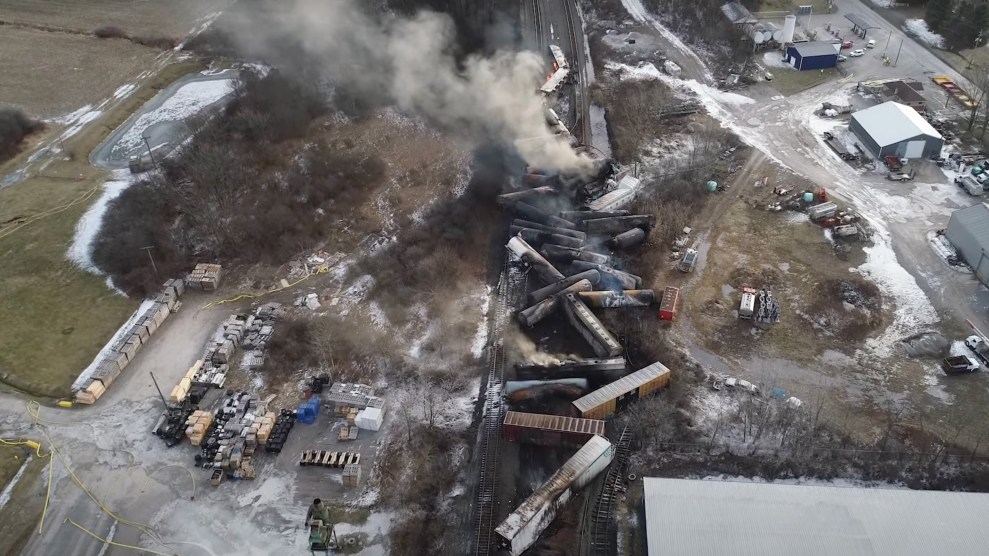
This is what capitalism-run-amok looks like.NTSB/Xinhua/Zuma
Earlier this month, a train carrying hazardous chemicals derailed in East Palestine, Ohio, triggering a massive fire and forcing everyone within a 1-mile radius of the crash to evacuate. To avoid a potential explosion, officials conducted a controlled detonation of five tankers three days later, sending carcinogenic vinyl chloride into the air. Two days later, residents of the 4,500-person village were told they could safely return home. Many questioned the safety of the air and water supply.
Since then, reporting has made clear that this environmental disaster was less a freak accident than a predictable outcome of lax safety measures and capitalist greed. Here’s what you need to know about the Norfolk Southern rail company.
Norfolk Southern chose not to upgrade its trains’ “Civil War-era” brakes.
A report in The Lever notes that the train that crashed in East Palestine was not equipped with Electronically Controlled Pneumatic brakes—fully electric brakes that experts say could have reduced the severity of the crash. Although Norfolk Southern once touted its use of ECP brakes, it lobbied against requiring them on trains carrying hazardous materials. An Obama-era rule required that HHFTs have ECP brakes, but the Trump administration overturned this rule.
Norfolk Southern workers don’t get paid sick time.
Remember when the Senate voted to avert a rail strike and deny workers sick leave? Norfolk Southern workers were among those affected. When investors encouraged Norfolk Southern to offer paid sick leave, the company said, OK, we won’t furlough people as often. Sen. Bernie Sanders (I-VT.) has since demanded that rail companies offer workers at least seven days of paid sick leave.
Rail companies refuse to hire enough workers.
Unions says that rail industry’s use of furloughs to reduce the workforce stretches staff too thin. As Timothy Noah wrote in the New Republic, the 141-car train that crashed in East Palestine carried just two crew members and one trainee:
On February 10, Anya Litvak of The Pittsburgh Post-Gazette reported that security camera footage 20 miles short of where the derailment occurred showed a rail car axle that appeared to be on fire. Why this information was not transmitted quickly to the train crew remains unknown, but it seems likely that the answer has something to do with the number of people who were in a position to sound the alarm.
Norfolk Southern has spent billions on stock buybacks.
Norfolk Southern made $4.8 billion in operating profit in 2022, More Perfect Union reported, and paid shareholders $4.7 billion in stock buybacks and dividends.
As my colleague Hannah Levintova explained last year:
A buyback is when companies purchase shares of their own company from investors, driving up the value of the remaining stock because there are fewer shares circulating. Buybacks are taxed at the lower capital gains rate, which maxes out at 20 percent for the wealthiest households. But for those investors who don’t sell their shares back to the company, there’s no tax—even though the value of their holdings has increased. Until that investor sells the asset, their wealth will grow tax-free. And thanks in part to a tax code loophole that enables the wealthy to pass shares on to their heirs, who can then skip paying capital gains taxes on them altogether, buybacks play a role in building untaxed generational wealth.
The train that caused the cloud of smoke over East Palestine was not categorized as a “high-hazard flammable train.”
Thanks to pressure from industry lobbyists, the “high-hazard flammable train” categorization applies only to trains carrying a narrow set of materials, like crude oil, The Lever also reported. That designation would have required that the train follow specific speed and braking restrictions.
Despite making billions in profit, Norfolk Southern initially offered just $25,000 to East Palestine.
Norfolk Southern managed to scrape together $25,000 for the town that’s been doused in toxic chemicals. People who fled their homes under fear of death can claim $1,000 per person per household. Since then, the company has announced increases in charity.
















